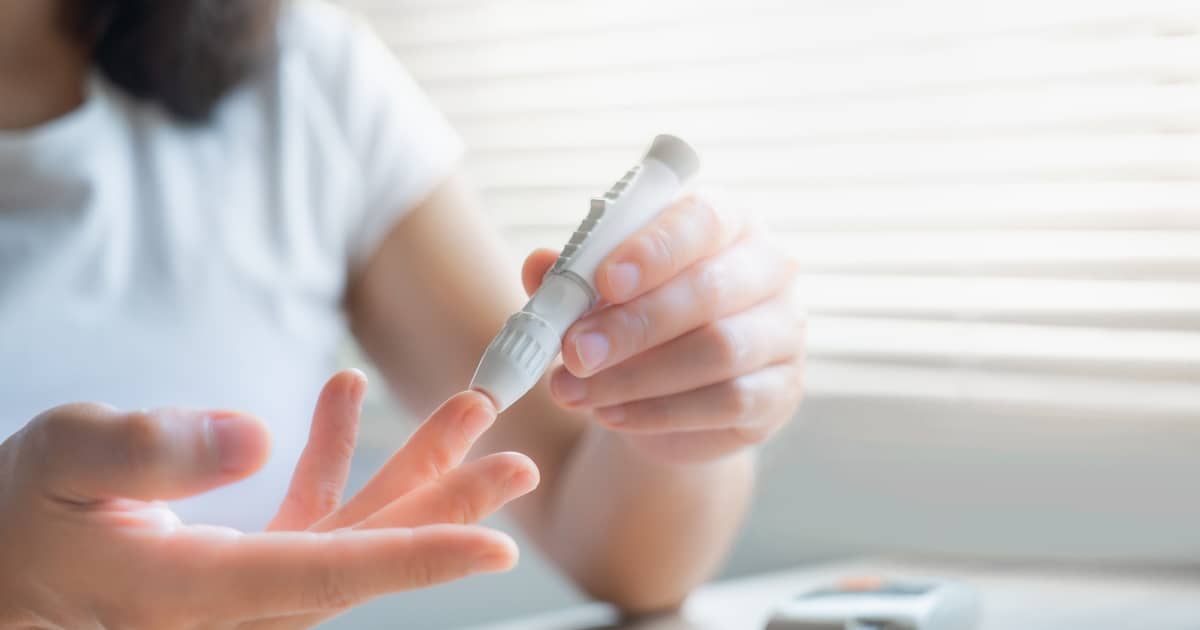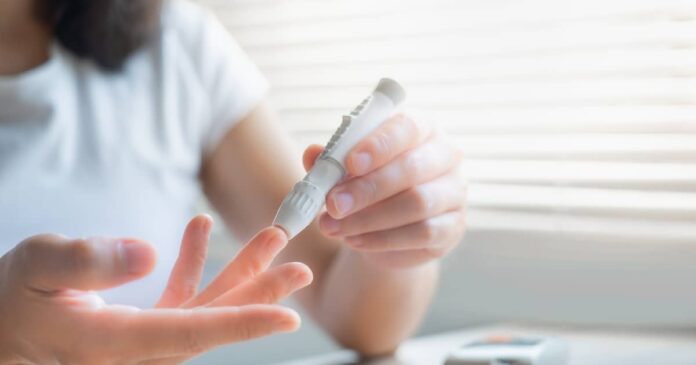Fighting each excessive and low blood sugars is just about an anticipated a part of residing with diabetes.
However reactive hypoglycemia is totally different from common low blood sugar ranges that individuals with diabetes encounter, because it has totally different underlying causes.
This text will inform you all the pieces it’s essential to learn about reactive hypoglycemia: what it’s, how one can handle it, and how one can higher stop it.
Signs of low blood sugar
It’s essential to acknowledge the signs of low blood sugar earlier than it turns into an emergency.
Low blood sugar is often outlined as any blood sugar stage beneath 70 mg/dL. Even folks with out diabetes can expertise low blood sugar!
The indicators to look out for embody:
- Shakines
- Dizziness
- Nervousness
- Issue concentrating
- Sweating
- Confusion
- Fast heartbeat
- Weak spot and excessive fatigue
- Feeling faint
- Starvation
- In extreme circumstances, lack of consciousness, coma, and loss of life
Should you’re affected by frequent low blood sugar ranges and also you do not need diabetes, you need to speak to your physician.
What’s reactive hypoglycemia?
Reactive hypoglycemia (additionally referred to as postprandial hypoglycemia) is a sort of low blood sugar that happens after meals, usually between 2-5 hours after you end consuming.
That is totally different from a fasting low blood sugar, because the trigger is the discharge of an excessive amount of insulin for the meals that was eaten.
There are three several types of reactive hypoglycemia:
Alimentary reactive hypoglycemia – That is the type of reactive hypoglycemia that happens round 2 hours after ending a meal.
Idiopathic reactive hypoglycemia – That is the type of reactive hypoglycemia that happens round 3 hours after ending a meal.
Late reactive hypoglycemia – This type of reactive hypoglycemia happens between 4 to five hours after ending a meal.
What are the causes of reactive hypoglycemia?
Researchers are unclear on the precise causes of reactive hypoglycemia. Nevertheless, individuals who typically endure from reactive hypoglycemia usually are both prediabetic or have diabetes and endure from gastrointestinal dysfunction, resembling gastroparesis.
Moreover, individuals who do not need diabetes however have a hormone deficiency generally even have reactive hypoglycemia.
Reactive hypoglycemia will also be attributable to a cancerous tumor, extreme alcohol consumption, or when recovering from surgical procedures, particularly gastric bypass or ulcerative surgical procedure.
Reactive hypoglycemia usually happens extra typically in people who find themselves obese and overweight. In truth, affected by reactive hypoglycemia, particularly late reactive hypoglycemia, might put you at increased threat for creating diabetes.
How do I handle reactive hypoglycemia?
Should you suspect that you’ve reactive hypoglycemia and also you do not need diabetes, ask your physician about getting a mixed-meal tolerance take a look at, or MMTT.
That is the place they will provide you with a candy drink made to lift blood sugar ranges, inflicting your physique to provide extra insulin. The physician will then intently observe your blood sugar over the following a number of hours, to see when you’ve got a spike after which a crash.
Dropping too low (beneath 70 mg/dL) a number of hours after ingesting the liquid might be an indication that you simply’re affected by reactive hypoglycemia.
Should you at the moment have insulin-dependent diabetes, you might wish to speak to your physician about reducing your insulin-to-carbohydrate ratio or taking much less long-acting insulin, or possibly each.
If you’re affected by low blood sugars after meals, have diabetes, however will not be on insulin, speak to your physician about doubtlessly reducing your diabetes drugs.
Nevertheless, when you’ve tried all of that and are nonetheless unsuccessful in remedy, beneath are some methods to implement to assist handle reactive hypoglycemia.
It’s essential to notice that there isn’t any scientific “remedy” for reactive hypoglycemia, however simply methods to blunt the pancreas’ response to meals that may assist stop such low blood sugars after meals.
First, deal with the low blood sugar
Remedying reactive hypoglycemia typically is totally different from treating an acute episode of low blood sugar.
Eat a minimum of 15 grams of fast-acting carbohydrates, resembling glucose tablets, juice, or one thing else candy like sweet, and take a look at your blood sugar once more to ensure it’s rising.
If you’re dangerously low and your blood sugar shouldn’t be responding to fast-acting glucose, name 911 instantly and have somebody offer you glucagon.
Eat smaller, extra constant meals
Attempt ensuring to eat a meal or snack each 2-3 hours, so that you’re by no means starved. Whenever you do eat, ensure that it’s not an enormous meal and an enormous carbohydrate dump. It will assist stop your pancreas from releasing an excessive amount of insulin, leading to low blood sugar.
Not consuming all day lengthy, after which consuming an enormous meal at suppertime can improve the bouts of reactive hypoglycemia, sending your blood sugar plummeting proper as you’re preparing for sleep.
Give attention to fats and protein
Whenever you do eat a meal or snack, ensure that it’s full of protein and wholesome fat, quite than easy carbohydrates.
Meals and snacks with plenty of processed and added sugars and carbohydrates require extra insulin and usually tend to lead to reactive hypoglycemic episodes.
Wholesome proteins and fat embody meals like salmon, full-fat dairy merchandise like Greek yogurt, peanut butter, seeds and nuts, additional virgin olive oil, coconut, avocado, and lean meat.
You may simply construct a meal round these meals objects, by including leafy greens and colourful greens that gained’t trigger a blood sugar and insulin spike.
Should you drink alcohol, don’t achieve this on an empty abdomen
Should you’re prone to low blood sugar ranges and reactive hypoglycemia and also you take pleasure in ingesting alcohol, all the time drink it with meals.
Alcohol lowers blood sugar ranges, and when you haven’t had something to eat for a number of hours, it might probably put folks with diabetes (even these with out!) in danger for low blood sugar ranges.
Higher but, pairing alcohol with a higher-fat, high-protein snack can guarantee smoother blood sugar ranges all night lengthy. Suppose cheese, olives, and uncooked greens with hummus alongside that cup of wine.
Train commonly
It’s essential to get common train to assist keep constant blood sugar ranges all through the day. Purpose to train within the early morning or afternoon, when insulin resistance is at its highest (and also you’re the least prone to go low).
Should you battle with reactive hypoglycemia after dinnertime, that isn’t the perfect time to train. Nevertheless, establishing an train routine on the identical time daily will assist your physique learn to reply to each carbohydrates and bodily exercise higher, thus decreasing the chance of extreme low blood sugar ranges.
Should you don’t know the place to begin, speak along with your physician about creating an train routine that may give you the results you want and your way of life.
Conclusion
Reactive hypoglycemia is a type of low blood sugar that occurs after meals.
Individuals each with and with out diabetes can endure from this situation, however it’s extra widespread in people who find themselves obese or overweight, are prediabetic, have diabetes and a gastrointestinal drawback, resembling gastroparesis, and people who find themselves recovering from surgical procedure, are combating alcohol dependancy, or have cancerous tumors or a hormonal imbalance.
There are a couple of methods to handle reactive hypoglycemia: the primary, when you’ve got diabetes, is by reducing your diabetes drugs and/or insulin. Speak along with your physician about how one can safely do that.
At all times deal with low blood sugar ranges beneath 70 mg/dL instantly and name 911 when you’re experiencing a extreme low blood sugar that’s not responding to remedy.
In the long term, you might decide to eat smaller, extra constant meals targeted on wholesome fat and proteins, train commonly within the morning, and solely drink alcohol with meals.
By taking these strategic steps, you possibly can assist handle reactive hypoglycemia and stop it from taking on your day.


